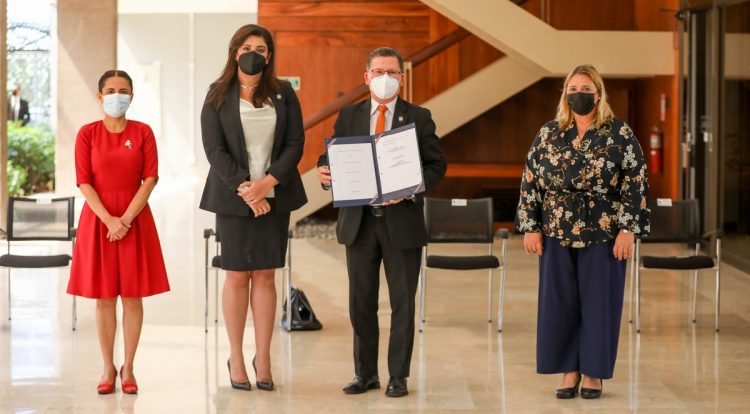This Law came about as an initiative of the Executive Branch, promoted by the Regional Planning Area of MIDEPLAN, with the support of the European Union through the EUROsociAL+ Programme, and processed in the Special Commission of the Province of Limón.

In order to promote regional development and progressively reduce the inequalities that are evident in the country, the acting President of the Republic of Costa Rica, Marvin Rodríguez Cordero, signed the Regional Development Law (10,096) together with the Minister of National Planning and Economic Policy, María del Pilar Garrido Gonzalo. The Minister of Finance, Elian Villegas Valverde, previously signed it.
The event, held in the lobby to the office of the Presidency of the Republic, was attended by the European Union ambassador in Costa Rica, María Antonia Calvo Puerta and the MP Yorleny León Marchena, chairwoman of the Special Commission of the Province of Limón, which processed the initiative.
“Its purpose is to promote regional development in Costa Rica, to improve the conditions and quality of life of the entire population, respecting the cultural, social, economic, environmental particularities and taking advantage of the synergies and potentialities of each region, in a context of democratic participation. Likewise, to progressively reduce regional imbalances through the design and implementation of differentiated and inclusive public policies,” as laid down in Article 1 of the text of the Law.
The acting president, Marvin Rodríguez Cordero, declared he was pleased with the signing of this law, which he classified as “a useful and effective legal tool”. “It will allow the State and the various public and private actors to reverse the process of territorial inequality that has been exacerbated in recent years. A responsible and participatory style of decentralisation is increasingly and decisively opening up the way to better and more legitimately deal with the gaps between territories and within them on the basis of awareness with regard to the environment and the well-being of all people without any distinction,” he stated.
For her part, the Minister of Planning, Pilar Garrido Gonzalo, highlighted: “This law will strengthen the legal and institutional force behind regional development in Costa Rica, it will enable the safeguarding of higher and better levels of governance, and the expansion of spaces for participation in which citizens of different regions play a role in the decision-making process of our country. Furthermore, it enables the Executive Branch, local governments and civil society to share the responsibility for managing the resolution of different territorial challenges and to close gaps between the Greater Metropolitan Area and the rest of the regions.”
The MP, Ms León, added: “The law recognises the regions as a space for planning, and the features particular to these regions, which are real demands that people have and that had been ignored for many years. The law makes it easier for actors in each territory to come to an agreement to resolve these demands and be able to institutionalise them through roundtables and negotiation agreements.”
Ambassador Calvo Puerta noted: “It is an honour for the European Union to be present at the signing of this National Law for Regional Development, which is a milestone in the regionalisation process of Costa Rica. We are very pleased to have accompanied Costa Rica in this process through our EUROsociAL+ programme and to have contributed through our experience with European Regional Policy.”
Contributions of the law
The Regional Development Law creates the Development Planning Subsystem in each region, whose purpose is the formulation, execution, follow-up and evaluation of intersectoral and inter-institutional actions to guarantee the development of the country. Furthermore, it transforms the current Regional Development Councils into Regional Development Agencies (AREDES), made up of representatives with decision-making power from the productive sector, civil society, academia, the municipalities, public institutions and territorial councils.
It also creates the National Fund for Regional Development (FONADER), which will be in charge of allocating resources to promote regional development and reducing interregional and intraregional socio-economic asymmetries. This will be financed mainly from budgets of institutions that will need to specify the investment to be made in each region. It will be administered by MIDEPLAN, in accordance with the regulations and procedures of the National Public Investment System.
The new law establishes the National Policy for Regional Development, the regional development plans and the Regional Development Observatory, as instruments for governance and development. Another novelty that it incorporates is the obligation of the Central Bank of Costa Rica to calculate a regional Gross Domestic Product (GDP), which enables the analysis of economic behaviour in each of the regions.



